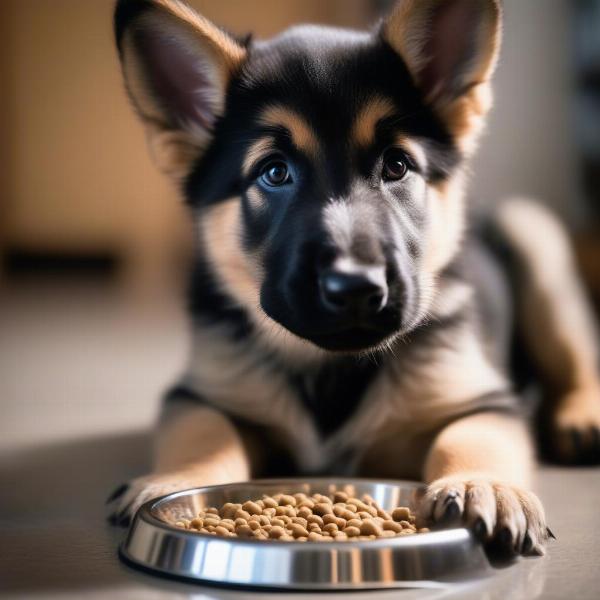Choosing the right food is crucial for your German Shepherd puppy’s growth and development. A healthy diet fuels their rapid growth, supports their developing immune system, and lays the foundation for a long and active life. This article will guide you through selecting the best dog food for German Shepherd puppies, covering everything from nutritional needs to specific brand recommendations.
Nutritional Needs of a Growing German Shepherd
German Shepherd puppies have specific nutritional requirements due to their rapid growth and predisposition to certain health issues like hip and elbow dysplasia. A balanced diet rich in high-quality protein, healthy fats, and controlled calcium and phosphorus levels is vital. Look for food specifically formulated for large breed puppies to ensure they receive the optimal balance of nutrients.
- Protein: Essential for muscle development and overall growth. Choose foods with animal-based protein sources like chicken, lamb, or fish.
- Fats: Provide energy and support healthy skin and coat. Look for sources like chicken fat or fish oil.
- Calcium and Phosphorus: Crucial for bone development but should be carefully balanced to prevent skeletal problems.
- DHA: An omega-3 fatty acid that supports brain and eye development.
- Glucosamine and Chondroitin: Can help support joint health, particularly important for large breeds.
 German Shepherd puppy eating from a bowl
German Shepherd puppy eating from a bowl
Choosing the Right Brand: Decoding Dog Food Labels
Navigating dog food labels can be daunting. Focus on the following key points:
- AAFCO Statement: Look for a statement indicating the food meets the nutritional levels established by the Association of American Feed Control Officials (AAFCO) for growth.
- Ingredient List: The first few ingredients should be high-quality protein sources. Avoid fillers like corn, wheat, and soy.
- Guaranteed Analysis: Check the minimum percentages of protein, fat, fiber, and moisture.
- Life Stage: Ensure the food is specifically formulated for “growth” or “large breed puppies.”
Recommended Dog Foods for German Shepherd Puppies
While individual needs may vary, the following brands often receive positive reviews for their quality and nutritional profile:
- Royal Canin German Shepherd Puppy: Formulated specifically for the breed, addressing their unique nutritional and developmental needs.
- Hill’s Science Diet Large Breed Puppy: Provides balanced nutrition for healthy growth and joint support.
- Purina Pro Plan Large Breed Puppy: Offers high-quality protein and essential nutrients for optimal growth.
- Eukanuba Large Breed Puppy: Supports healthy development with controlled calcium levels and added glucosamine and chondroitin.
Feeding Schedule and Portion Control
Establishing a consistent feeding schedule and appropriate portion sizes is essential. Overfeeding can contribute to rapid growth, which can exacerbate joint problems in large breeds. Consult your veterinarian or the feeding guidelines on the dog food packaging for specific recommendations based on your puppy’s age and weight.
Transitioning to Adult Food
As your German Shepherd puppy approaches adulthood (around 12-18 months), you’ll need to gradually transition them to adult dog food. Mix increasing amounts of the adult food with their puppy food over a period of 7-10 days to avoid digestive upset.
Conclusion
Choosing the best dog food for your German Shepherd puppy is an investment in their long-term health and well-being. By understanding their nutritional needs, carefully reading labels, and choosing a reputable brand, you can help your puppy grow into a strong, healthy adult. Remember to consult your veterinarian for personalized advice based on your puppy’s individual needs.
FAQ
- How often should I feed my German Shepherd puppy? Puppies should be fed 3-4 times a day until they reach around six months of age, then transitioned to twice-daily feedings.
- What are signs of a food allergy in a puppy? Common signs include itching, skin rashes, digestive upset, and ear infections.
- Can I give my puppy homemade food? While possible, it’s crucial to consult with a veterinary nutritionist to ensure the diet is balanced and meets your puppy’s nutritional needs.
- When should I switch my puppy to adult food? Most German Shepherds can transition to adult food between 12-18 months of age.
- What are the best treats for German Shepherd puppies? Look for small, easily digestible treats specifically formulated for puppies.
- Is it okay to supplement my puppy’s diet with vitamins? Generally, a complete and balanced puppy food provides all the necessary nutrients. Consult your veterinarian before giving any supplements.
- What should I do if my puppy won’t eat their food? Ensure the food is fresh and at room temperature. If the problem persists, consult your veterinarian.
ILM Dog is a leading international pet website dedicated to providing expert advice on dog care and nutrition. We offer valuable information on breed selection, health care, training, and more. For tailored advice on choosing the perfect food for your German Shepherd puppy, or for any other dog-related inquiries, contact our team of experts. Email: [email protected], Phone: +44 20-3965-8624. Visit ILM Dog today for all your dog care needs.